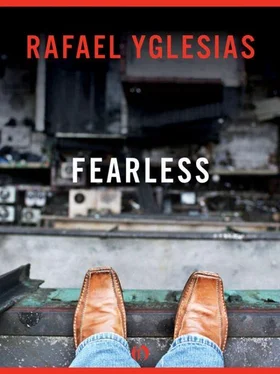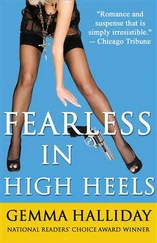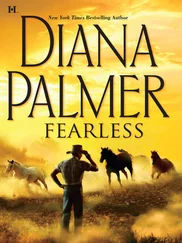“Please, Max,” she called from the sitting room. “Be nice.”
“Goodbye, Carla,” he said quickly, but not quickly enough. His voice caught on the last syllable of her name and they could both hear the choked noise of his loss as she shut the door behind her.
Carla walked home, despite the cold gray weather. She wanted to be outside and see all the people and stores and buildings. She went down Fifth Avenue, dignified and wealthy at midtown, seedier below Forty-second, and a mess south of Twenty-third because of repairs on something that had exploded underneath the street. She cried — or rather her eyes teared — for part of the journey. But although her heart was sad, it was also an easy load to carry. She didn’t feel she had lost Max; at least not the angel who had saved her. She had lied, of course, about them being able to talk eventually. If what she had done was right, if she had solved His mystery, then Max would be well again and soon forget her. That was not a loss: she had regained herself and what Max had given her she would always have.
When she reached Mulberry she went into Old Saint Pat’s and lit a candle for Bubble. She would never go to confession to be absolved for last night’s sin — that would have broken the agreement with Him. Instead she knelt and prayed to Him to allow her to conceive another child.
The Monsignor happened by and waited for her by the door. He looked at her curiously and said, “Hello, Carla. You’re looking very fit.”
“Hello, Monsignor. Did you get my message? I wanted to find out if I could volunteer for work at the Foundling Hospital.”
“I already gave them your name and phone number.” He chuckled. “You’re certainly going to be hearing from them.” He followed her down the steps to the street; she watched him negotiate the steps warily. “Did you hear the news about Pierre Toussaint? He’s a candidate for sainthood. The committee’s going to exhume his body next month. Cardinal O’Conner himself will preside. He’s going to bless the grave and dig the first shovelful. It’s very exciting. Toussaint is the first black candidate for sainthood in America.”
“What did he do?” Carla asked.
“It’s a very interesting story.” Monsignor O’Boyle lifted his right hand in a lecturing gesture. She noticed his hand trembling faintly. She felt he would die soon. She smiled patiently while he explained that Toussaint was a Haitian slave brought to the United States by the family that owned him. The family lost all its money shortly after emigrating and rather than deserting them, Toussaint had worked as a hairdresser to support them. Years later, when they had recovered their wealth, they gave him his freedom. As a freeman he devoted the rest of his life to caring for the poor and sick.
“They kept him a slave while he was making money for them to live on?”
They had reached the last step. Monsignor O’Boyle was breathing hard through his nose and his white face was even more bloodless. His eyes looked scared. He nodded.
“Are there black children at the hospital?” Carla asked.
Monsignor O’Boyle frowned at her. “It doesn’t have anything to do with race,” he said in a breathless whisper. “The hospital accepts all children with special problems who need its services.”
“Sure,” Carla said and smiled. She gave him her hand.
His trembling continued while he held it. “There are plenty of black children there,” he said softly.
She kissed him goodbye on the cheek. She had never done that before; he looked startled. She felt wild and happy, eager to get on with her life. She hurried across the street and up to her apartment. It was just after lunch and she would have plenty of time to prepare a meal for Manny when he got home.
Only he was already home. She discovered him in the living room wearing his handyman’s work pants. His shirt was off. His thick powerful chest was almost hairless, the skin dark enough so that anyone might think he had a tan. He had a fifth of rum in his right hand, dangling there as if it were a soda bottle. It seemed to be half gone. She had never seen him drink anything other than beer and never more than two.
Manny looked at her as she stood in the doorway with a mild almost uncomprehending stare.
“Remember me?” she said, trying to be cheerful.
He grunted and took a slug from the bottle. Some of it ran down the side of his mouth.
“You’ll make yourself sick,” she said. “You don’t drink.” She went over to the couch and took hold of the bottle. Manny held on and stared at her.
“Bitch,” he said in a mumble.
“Okay,” she said and gently pulled the bottle away. She put it on the coffee table.
Manny spread his arms wide, resting them on the backrest of the couch. “We’re rich,” he said. He slurred the words. “We’re as rich as those fucking tenants I slave for.” Manny tried to laugh, but the sound he made was more like a moan. His head bobbed unsteadily. “That fucking lawyer called. They made some kind of mistake — I didn’t understand. But they offered more than—” Manny tried to get up. He lifted the upper half of himself off the couch but had to fall back. “We got half a million dollars.” He laughed. “Five hundred fucking thousand dollars.” He laughed again. Tears were in his eyes, his head weaved and bobbed, and he kept laughing, a sad giggling chortle. “Unfuckingbelievable. I’m a rich man,” he said and the laughter stopped. He gagged. She sat next to him, put her arms around his strong shoulders and was ready for him to be sick. Instead the gagging became sobs. “I’m so fucking rich,” he blubbered through the weeping. “I’m so fucking smart,” he mumbled and then again, “I’m so fucking rich. I’m so fucking smart.”
She hugged him and shushed him and kissed him. He didn’t cry for long. He smelled sickly sweet. After he had been quiet for a while he said in a croaked voice, “I love you.”
They were going to be all right. She coaxed him off the couch and guided him toward the bedroom. They passed his discarded shirt in the hallway.
“Stay with me,” he said as he sagged onto what used to be their marriage bed.
“I’m going to be with you from now on, Manny,” she said, sitting beside him.
“I want to have another son,” he said petulantly.
“Me too,” she said and knew that she would.
Max took his time washing and dressing to go home. He felt he was saying farewell to something in that hotel room, something more than just the sex — the unsafe sex — he and Carla had enjoyed. He felt as if he were saying goodbye to himself.
At the door, dressed and ready to go, he was afraid to leave. He tried to think of something that Americans weren’t afraid of. When he decided he couldn’t he left.
He took a cab to his apartment building. The day was cold and gray. New York’s buildings were chameleons to Max; they turned dull with cloudy skies and glittered white with the sun.
The doorman — David — seemed to be surprised to see him. “Your wife just went out,” he said after recovering from the shock.
Max went up in the elevator wondering about lunch, whether he should wait for Debby and take her out for a fancy meal. Cafe des Artistes was her favorite restaurant. Its campy design gave Max headaches, but to see her smile and feel at ease with him would be well worth it.
Jonah upset that plan. He was upstairs alone. He had felt ill at school and Debby had brought him home. She was out buying Tylenol. “I’ve got a hundred and one temperature,” Jonah said. He was very pale, dressed in a long New York Mets shirt, lying in his bed watching a game show on television.
Max shut the set off and sat beside Jonah. He brushed the hair off his boy’s forehead. He kissed his smooth brow. The skin radiated heat. They were quiet for a moment.
Читать дальше












